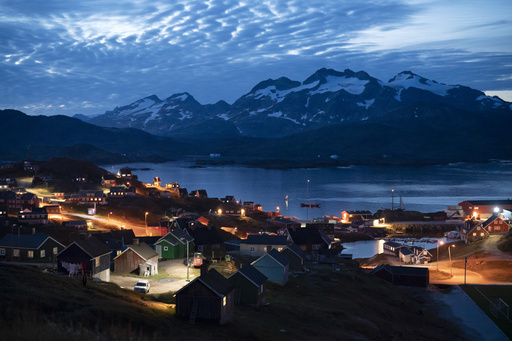
WEST PALM BEACH, Fla. — Once again, Donald Trump is expressing interest in acquiring Greenland, reigniting talks he made during his previous presidency about the United States purchasing the large island from Denmark. This renewed insistence comes even before he officially takes office on January 20, and it adds to a string of contentious remarks aimed at allied nations.
In a recent announcement regarding his ambassador to Denmark, Trump stated, “For purposes of National Security and Freedom throughout the World, the United States of America feels that the ownership and control of Greenland is an absolute necessity.”
The spotlight on Greenland follows other controversial comments from Trump over the weekend, including threats to reclaim control of the Panama Canal amid rising shipping costs associated with the vital waterway connecting the Atlantic and Pacific oceans. He also floated the notion of integrating Canada as the 51st U.S. state and playfully referred to Justin Trudeau as the “governor” of “the Great State of Canada.”
Stephen Farnsworth, a political science professor at the University of Mary Washington, pointed out that Trump’s aggressive approach echoes tactics from his business career. He explained that when one makes unreasonable demands, it could lead to achieving something more realistic in negotiations.
Greenland is the largest island globally and primarily lies between the Atlantic and Arctic oceans. Approximately 80% of its surface is covered by an ice sheet, and it also hosts a significant U.S. military installation. Although Greenland gained home rule from Denmark in 1979, its head of government, Múte Bourup Egede, reacted to Trump’s remarks, asserting, “Greenland is ours. We are not for sale and will never be for sale.” Egede emphasized the importance of maintaining their long-standing pursuit of freedom.
Previously, Trump had to cancel a 2019 visit to Denmark due to Copenhagen’s rejection of his offer to acquire Greenland, which went nowhere. Recently, he suggested that the U.S. is being “ripped off” by the Panama Canal. He articulated that if the founding principles of the treaty regarding the canal aren’t honored “both morally and legally,” the U.S. would demand its return without hesitation.
In response, Panama’s President José Raúl Mulino asserted in a video that “every square meter of the canal belongs to Panama and will continue to,” but Trump countered on social media, saying, “We’ll see about that!” He even shared an image of a U.S. flag in the canal zone with the caption, “Welcome to the United States Canal!”
The canal, constructed by the U.S. in the early 1900s, was transferred to Panama’s control on December 31, 1999, following a treaty ratified by President Jimmy Carter in 1977. The canal has been facing operational challenges; recent droughts in 2023 have strained its water reservoirs, significantly reducing the number of ships able to cross daily, which in turn increased handling fees for shipping companies.
These recent flare-ups regarding Greenland and Panama coincided with Trump remarking that “Canadians want Canada to become the 51st State,” alongside a playful image of himself standing next to a Canadian flag atop a mountain. Trudeau interpreted Trump’s comments as a joke about annexation. However, they previously met at Trump’s Mar-a-Lago resort to discuss potential trade tariffs targeting Canadian goods.
Farnsworth commented that while Canada is unlikely to join the United States, Trump’s comments serve to unsettle Canada for leverage. He added that this creates room for negotiation, especially in light of Canada’s current unstable political climate. “What Trump wants is a win,” he stated, suggesting that even if a U.S. flag doesn’t fly over Greenland, his tactics might yield favorable concessions from European nations in future discussions.

